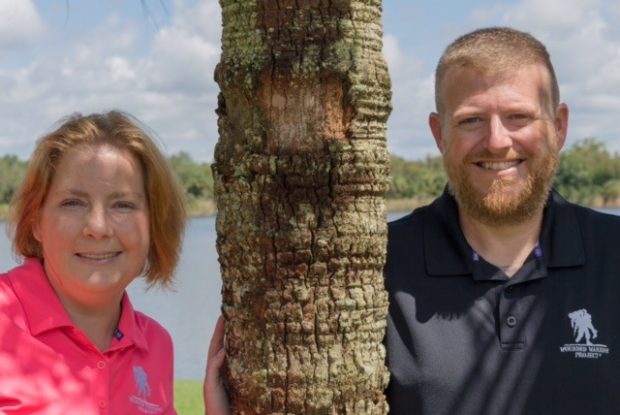
In combat situations, the mind reacts instinctively, collecting and sorting memories that can be excruciatingly difficult for warriors to endure during the inevitable recall process. Therefore, the mind’s “filing system” and unintentional memory recall can elicit great harm to a combat veteran’s mental health and wellbeing.
Today, this is known as post-traumatic stress disorder (PTSD). Many warriors coping with the invisible wounds of war, unknowingly, fall deep in its trenches.
PTSD can dismantle a warrior’s life if not given the tools and treatment needed to succeed in recovery. Many warriors are concerned with the stigma associated with injuries that are not visible. They either never step up to receive the treatment they need, or they begin to self-medicate.
“I’ve been in a place where hope doesn’t exist,” said Joseph Willis, U.S. Army veteran from Titusville, Florida. “I’ve been blown up three times during my deployments, and now I struggle with post-traumatic stress and a traumatic brain injury.”
The signature weapon of the Global War on Terrorism was improvised explosive devices (IED), accounting for the majority of wounded and killed military personnel in combat situations. IEDs can be produced in varying sizes and have different types of containers, functions, and delivery methods. Their shells are typically packed with common hardware to enhance fragmentation that increases bodily damage, which include, but are not limited to, ball bearings, bolts, nuts, nails, chemicals, and more.
Due to advances in medical technology, many service members are surviving wounds associated with IEDs and other explosive weapon systems. These warriors live with the aftermath of their bravery for the rest of their lives.
On a quest to rediscover hope, Joseph attended a mental health workshop with Wounded Warrior Project® (WWP). WWP offers intense all-male and all-female multi-day mental health workshops for veterans coping with the invisible wounds of war. These help warriors and their families maintain healthy, meaningful relationships while pursuing life goals – free from the stigmas associated with mental health issues.
Combat veterans typically isolate themselves from society and their families, often making these workshops the first time they become active in their recoveries. WWP empowers healing warriors through these specialized mental health programs and services – tailored to each warrior’s specific needs and free of charge.
WWP recognizes invisible wounds are not only felt by the warrior – but the family too. Often, family members take up arms for the battle back home, stepping into their new roles as caregivers for their injured service members. The lives of caregivers are tremendously impacted by this role.
“Coping with my husband’s post-traumatic stress and traumatic brain injury has been stressful on our marriage at times,” said Lisa Willis, wife and caregiver of Joseph. “I haven’t always dealt with it the best I should in the past, but it’s a learning process, and every bit of support helps – from Wounded Warrior Project, family, and Christ.”
WWP serves more than 23,000 caregivers and family members of injured service members, providing education on its programs and services, connection and networking opportunities with peers, and opportunities to help alleviate the tremendous stress that a warrior’s injury places on the entire family. This is available free of charge to warriors, caregivers, and family members thanks to generous donors.
WWP also offers all-couples mental health workshops that provide safe, private environments for warriors and their significant others to express themselves and share their experiences. WWP staff use special activities in a recovery model that allows warriors to be vulnerable to the unknown and identify and work through anxieties together.
“When I attended the all-male workshop, I recognized a change in me,” Joseph said. “I realized I can do anything with my wife, my kids, and the Holy Spirit. I can achieve recovery with them by my side and with the tools I learned at the workshop. I can only imagine what it will bring to me and my wife attending the couples workshop together.”
His wife is equally hopeful.
“We are looking forward to attending and meeting other couples dealing with similar issues for support,” Lisa said. “I look forward to understanding more about my husband and him seeing my world as a caregiver. We are blessed to have this amazing opportunity to learn invaluable communication skills that can only improve our marriage and commitment to my husband’s recovery.”
WWP recognizes the integral role that family members and caregivers play in a warrior’s successful transition and reintegration into civilian life and is here to support the entire family with a full range of the programs and services. When warriors serve their country, their whole family serves with them. When a family’s warrior returns home injured, they deserve that same level of support. They deserve to know they are not alone.
If you or someone you know suffered an injury in connection with military service, please contact the WWP Resource Center at resourcecenter@woundedwarriorproject.org or 888.WWP.ALUM (997.2586).
About Wounded Warrior Project
We Connect, Serve, and Empower
The mission of Wounded Warrior Project® (WWP) is to honor and empower Wounded Warriors. WWP connects wounded warriors and their families to valuable resources and one another, serves them through a variety of free programs and services, and empowers them to live life on their own terms. WWP is a national, nonpartisan organization headquartered in Jacksonville, Florida. WWP is an accredited charity with the Better Business Bureau (BBB), is top rated by Charity Navigator, and holds a GuideStar Platinum rating. To get involved and learn more, visit woundedwarriorproject.org.
By Michael Richardson




